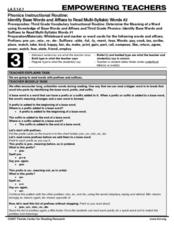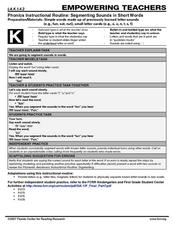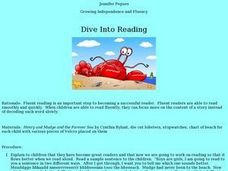Curated OER
Fluency: Read Regular Words
Second graders engage in a timed choral reading activity to practice reading with accuracy and fluency. The teacher starts the timer and taps a reading rhythm on the desk as the class reads a series of words in unison. When the time is...
Curated OER
Phonics: Identify Base Words and Affixes to Read Multi-Syllabic Words
Encountering a new an unfamiliar word can stump even the best readers. Third graders learn how to assess the base, prefix, and suffix of words to help them determine its meaning. The class works together to go over a series of common...
Curated OER
Phonics: Words with More Than One Syllable (CV/C) Rule A
Knowing basic phonics rules can help learners increase their reading accuracy, pronunciation, and spelling. Third graders practice breaking or chunking words based on the cv/c syllable rule. They take note of where to break each word,...
Curated OER
Phonics Instruction: Writing Simple Words
Sound it out, read it, then sound it out, and write it. Little ones work as a class to sound out simple words. After they have sounded out each word they will write that word on the white board. This is a great way to build a connection...
Curated OER
Fun With Fluency
Practice reading with fluency by blending words together. To start, prepare flash cards with pseudowords on them (words that can be pronounced but have no real meaning), and work with the class to sound out the words using known...
Curated OER
Phonics Instructional Routine: Read and Write Words with Consonant Digraphs
Use consonant digraphs to introduce learners to word patterns and high frequency words. They observe a chart with the digraphs /sh/, /ch/, /th/, and /wh/. After listening to each of these phonemes, scholars watch as the teacher...
Curated OER
Phonics: Decoding Words in Connected Text
Decoding words in connected text can make emergent readers really feel like they are great readers. They work as a class to sound out simple cvc words located in super short sentences. Tip: Extend this activity by having a variety of...
Curated OER
Phonics: Decode and Write Words
Sounding out individual phonemes and blending them to make a word is usually one of the first tasks mastered when learning to read. Make master decoders out of your learners, they sound out a series of simple two and three-letter cvc...
Curated OER
Phonics: Decode and Write Words with Blends
Kids see, say, then count the phonemes they hear in a series of simple words. They practice counting phonemes with the teacher, then sound out the same word on their own. As they count each phoneme they write it down on their paper. A...
Curated OER
Phonics: Read and Write Words with a Consonant Blend
Reading often times starts with phonemic awareness and letter sound correspondence. Get little ones blending those letter sounds together to read and write simple words. As the teacher sounds out each word, learners count phonemes, and...
Curated OER
Phonics: Segmenting Sounds in Short Words
F-u-n spells fun. It is a simple word that little learners can sound out as they build phonemic awareness and those early reading skills. This short scripted lesson provides teachers with the basics for teaching how to sound out...
Curated OER
Oral Reading Fluency: Reading Text with Proper Expression
Kids practice reading fluently with expression. They listen closely as their teacher reads a short paragraph, take note as she points out how she read each sentence, and then read along with her. They read to passage several times until...
Curated OER
Dive Into Reading
Learners observe and demonstrate various reading strategies to improve their reading fluency. The teacher first models smooth speech. In pairs, pupils take turns reading from the book Henry and Mudge and the Forever Sea by Cynthia...
Curated OER
Using the Sounds of Words Reading Task
Young readers demonstrate phonemic awareness in words and blends, and recognize 100 high-frequency words. Use a nursery rhyme to point out rhyming words, and change the words by putting a new letter at the beginning. Each learner will...
Curated OER
Using Initial Sounds and Picture Clues to Read Unknown Words
Kindergarteners read the bold words that are unknown by using the strategies of initial sound and picture clues. They meet individually with their teacher in order to assess this concept. Excellent resource!
Curated OER
Fluency: High Frequency Words
Boy, this lesson sounds like a high frequency blast. If you think that sounded sarcastic, it was. Learners watch as the teacher reads the high frequency word..... the! They read the word with the instructor over and over until they have...
August House
Why Koala Has a Stumpy Tail
Learn about the animals of Australia with a language arts lesson about an Australian folktale called, Why Koala Has a Stumpy Tail. After reading the story as a class, kids discuss events and characters from the book, retell the...
Curated OER
Comprehension: Identify Story Grammar
This fully scripted lesson could be a big help for someone new to teaching Kindergarten. It outlines what you should do and say as you teach grammar and literary elements such as, main character, setting, and events through reading. The...
Curated OER
Phonics: Read and Write Irregularly Spelled Words
Kids practice saying and identifying words that have irregular spellings. They consider the words said, come, and does by breaking them down into how they are commonly pronounced versus how they "should" be pronounced given their spelling.
Curated OER
Phonics: Two Syllable Words
Learning the rules can make any task clear and achievable. Second graders have the task of segmenting two-syllable words. Lucky for them, they have a rule to guide them as they go along! They underline all the vowels in each word and...
Curated OER
Phonics: Decode and Write Words with the “Silent e”
What happens when I add an 'e' to the word mad? It becomes made! Decoding and writing words with the silent e is the lesson for today. The class discusses what the e can do to a cvc word, then they practice adding e's to various words in...
Curated OER
Phonics: Segmenting Words with two or three phonemes
Kindergarteners build phonemic awareness by segmenting words with two or three phonemes. As the teacher says each word, the kids put up a finger for each phoneme they hear. This can also be done with manipulative such as blocks or tally...
Curated OER
Identify Base Words and Suffixes to Read Multisyllabic Words #1
Show your scholars how adding an affix changes the entire meaning of a word; they focus on the suffix -able. You'll find a complete script here, but if you don't want to read this verbatim, use it simply as an outline. Learners...
Curated OER
Lights, Camera, and Action!
These activities center around acting out a play to help create fluent readers who use expression and emotion. As readers work through the play the first time, they also practice decoding strategies. In small groups of four, they then...























